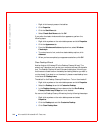
252 Microsoft® Windows® XP Features
www.dell.com | support.dell.com
• AutoUpdate installation — When you choose to install the update,
System Restore creates a restore point before the actual installation of
the update begins.
• Restore operation — The restore operation itself also creates a restore
point for undo purposes.
• Microsoft Backup Utility recovery — Before Microsoft Backup Utility
(only available in Windows XP Professional) performs a backup
recovery, System Restore creates a restore point.
• Unsigned driver installation — The INF installer of Windows detects
unsigned device-driver installations. Drivers that are signed
(electronically certified by the device manufacturer) do not generate a
restore point.
Manual Restore Points
If you are logged on to the computer as computer administrator or as a user
with administrator rights, you may create and name an on-demand restore
point. (For information on types of user accounts, see “How to Add Users.”)
This is useful to create a checkpoint to return to before making a
particularly risky change, before leaving a shared system to other users, or at
a particular state you believe is optimal.
To create a restore point, perform the following steps:
1 Click the Start button, point to All Programs—> Accessories—>
System Tools, and then click System Restore.
2 Select Create a restore point and click Next>.
3 Type a description of the restore point and click Create.
The date and time are automatically added to the description of the
new restore point.
Restore Process
As the computer is used over time, restore points are collected in the archive
without any management or intervention. If you encounter operating
system problems, you can use the System Restore feature to select any of
the restore points presented through the System Restore Wizard.
If problems occur after installing a device driver, you should first attempt to
use Driver Rollback. If that is unsuccessful, then use System Restore.


















